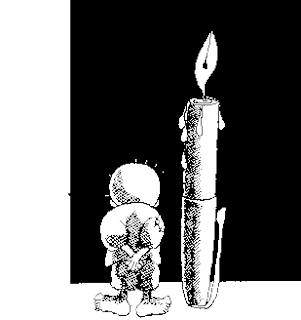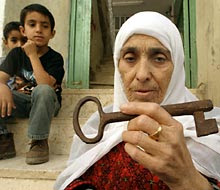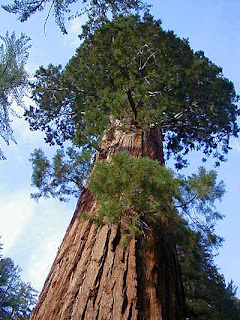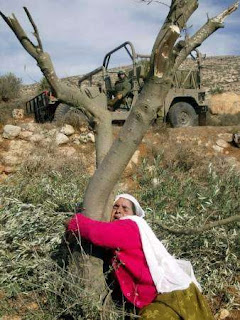Tuesday, August 21, 2007
Al-Faraheen's victims of Israeli pretexts
Surveillance cameras and watchtowers loom over more than 800 meters away from the scene of destruction left by Israeli army tanks and bulldozers following the latest Israeli invasion of the al-Faraheen area in Abbassan al-Kabeera town, to the east of Khan Younis in the southern Gaza Strip."Fifteen dunums [four acres] of tomatoes along with 400 meters of irrigation pipes were crushed by the Israeli tanks during the invasion into our area, where myself and two other partners make our living," says Samir al-Naqa, a local farmer in the al-Faraheen area.
Samir affirms that the invasion took place in the middle of the day. "I'd bet whether there was a single resistance fighter in the area; I'd bet the Israeli army whether there is a single tunnel in the area. It's our land, through which we feed our children. Where to go, we have no other choice, despite the fact they invaded the area about four times this year."Israeli media quoted sources who claimed that the invasion was a bid to prevent Palestinian attempts to smuggle weapons through underground tunnels.
When one walks down the arable lands in al-Faraheen, following Tuesday's invasion, one is struck by the sight of heaps of torn apart olive trees, dead tomato vines and holes in nearby walls thanks to the Israeli tanks that wreaked the destruction ostensibly in pursuit of resistance fighters or in search of underground tunnels.
Almost 800 meters away lies a long barbed-wire fence that separates al-Faraheen from Israel. This fence is equipped with surveillance cameras and watchtowers, in a way that not only prevents infiltrators but also discovers any moving object.
"I hope there was a single tunnel that Israel can destroy; we have been living here for ages. All their allegations are false ones," says Anwar Abu Daqqa, a 43-year-old landlord.Anwar gave a tour of the areas where the Israeli army tanks rolled through, including a newly-built graveyard that was damaged by the tanks."Look, sir, I am in charge of this small cemetery; how come the tank rolls over graveyards -- are they tunnels? Are there resistance fighters hidden inside? I really wonder and I bet whether a single resistance fighter can come to our closed area. Many times I myself prevented resistance fighters from approaching the area, for concern over our children's lives," Anwar maintains.
Anwar himself lost 30 cows during an Israeli invasion into al-Faraheen last year when the Israeli army remained in the area for 24 hours, so he decided to sell the rest of his livestock.Heading deep inside the populated area, there is another scene of destruction created by Israeli tanks and shells -- a completely destroyed three-story house, where the Israeli army killed two resistance fighters of Hamas along with the 70-year-old mother of one of them.Mohammad Qdaih, an eyewitness, recalls the events. "When the army shot dead Omar al-Qarra, Omar's mother rushed to her son out of her great concern. However, the Israeli soldiers shot her dead over Omar's body."Safa' Braim, a local woman, described the Israeli invasion. "They were [the Israelis] shooting at the houses heavily and randomly. We could not even look from the windows. This is not the first time that they invade our area; what we need now is that they stop their aggression against us and leave us and our children to live safely at least."
Tuesday's Israeli invasion into the al-Faraheen area in southern Gaza claimed the lives of seven Palestinians, including an elderly woman and two resistance fighters, and caused the injury of more than 35 others, including five who are critically wounded. According to local sources, the area has been invaded five or six times over the past year and a half and each time, tanks have left behind horror, destruction and death.
Sunday, August 19, 2007
Let's show that we mean business with Palestine
Viewpoints, Outlook
Let's show that we mean business with Palestine
Break through restrictions that hold back prosperity
By FAROUK SHAMI
Presidents and prime ministers, secretaries of state and special envoys have spent nearly six decades trying to solve the seemingly intractable Palestinian/Israeli issue.
I am not a politician. I am a businessman. And I know what those who want peace also surely must know. There cannot be peace without economic development and justice.
I came to America in 1964 from a small village in Palestine. I had little money in my pocket and washed dishes in restaurants to pay for my college tuition. Today, I run a $400 million beauty products company that employs more than 10,000 Americans.
I built my company from the ground up, initially developing hair care products in my garage. I have America to thank. I work hard and pay my taxes. I give back to my community. All the rights and opportunities that come with American citizenship are mine. In my 43 years here, I never felt the sting of discrimination.
Then I visited Palestine this summer. I went there in order to invest in my country of origin, with plans to build a hair products factory that will employ a projected 500 Palestinians.
I traveled with my business partner who is also American — an American named John, not Farouk. We had to pass through Israeli border controls in order to enter the occupied Palestinian West Bank. We were forced to stand in separate lines, because of my ethnicity. We had to fight for the right to drive in the same car.
Coming from America, where people are no longer separated based on race or religion, my sense of fairness was offended. But discrimination is a fact of life for Palestinians under Israeli rule. West Bank Palestinians drive on separate, decrepit roads and are routinely subjected to lengthy waits at checkpoints, while Israeli settlers living on confiscated Palestinian land speed by on modern freeways. West Bank Palestinians must ration water, while Jewish settlers cultivate lush lawns and fill their swimming pools.
Several Palestinian-American businesspeople invested in the West Bank and Gaza after the signing of the Oslo Peace Accords in 1993. But the years after Oslo led to a shrinking land base and crippling restrictions on Palestinian movement. The number of Israeli settlers living on Palestinian land doubled. And Palestinian farms, villages and cities were dissected and isolated by the networks of roads built to serve Israeli settlers and by Israel's wall that swallows up huge swaths of West Bank land. Hundreds of checkpoints stifle the movement of goods and people, preventing young Palestinians from getting to school, to work and to their families. Palestinian businesses fail because Israeli travel restrictions and closures prevent workers from reaching work. Business owners cannot import the raw materials they need or export the goods they produce.
Palestinians have the human capital to build a strong, independent economy. We do not need to rely on international handouts. But our hands must be untied. For our ventures to succeed there must be an investment-friendly environment.
The absence of economic and social freedom for Palestinians is in no one's long-term interest — not Palestinians, nor Israelis, and certainly not Americans. Polls show that our unquestioning support of Israel fuels anti-American sentiment in the Arab and Muslim worlds.
Palestinians must enjoy economic rights and the freedom of movement necessary to build a thriving economy. Job creation will bring hope and economic security. Hope and economic security can bring peace.
Many players can advance the quest for peace.
Palestinian-Americans are a wealthy community with an important role to play. We must take our dollars and skills and invest in Palestine in greater numbers.
Israel needs to ease the stifling restrictions on the movement of Palestinian goods and people, and end its policy of discriminating against non-Jews under its rule.
And America, the largest supplier of diplomatic, military and financial aid to Israel, needs to insist that Israel treat the Palestinians fairly and with respect.
Instead of building walls to separate the two peoples, let us build joint ventures to compete in the world market. A better world is within reach if we all join to demand that all the people living on the same land — Jewish Israelis, Christian Palestinians, Muslim Palestinians and everyone else — enjoy equal rights, just as we do in America.
Shami, a Houstonian, is founder and chairman of Farouk Systems, a professional hair care and spa products company headquartered here.
http://www.chron.com/disp/story.mpl/editorial/outlook/5064180.html
Monday, August 13, 2007
Ragged Little Boys and Keys Scare San Francisco Zionists


Wanna know how to scare a Zionist?
I strongly disagree with the compromise you've reached with the Jewish community which means that Handala with the house key is excluded from the mural. Evidently, in order to appease the Zionists, GUPS has foolishly agreed to a mural which is useless since the heart and soul of Palestine, the sacred and inalienable right to return, symbolized by Handala holding a key, will not be depicted on the mural. Instead of compromising, I wish that GUPS had carefully explained that the Palestinians' right of return is part of international law, as stated in Article 13, Section 2, of the Universal Declaration of Human Rights.
It pains me to see young Palestinians so quick to compromise on human rights in order to have the opportunity to attend concerts with their oppressors (“The last couple of years, our Israel Coalition has been putting out feelers all the time, inviting them to all the concerts we’ve had on campus. And they’ve been coming, which they hadn’t in the past.”),
http://www.jewishsf.com/content/2-0-/module/displaystory/story_id/33201/format/html/displaystory.html
A reminder about Handala from Naji Al Ali:
http://www.handala.org/naji.html
"I am Handala from the Ain Al-Helwa camp. I give my word of honor that I'll remain loyal to the cause..."
How telling really that the Zionists are so frightened of the symbol of a barefoot, ragged child, and how ashamed I am that Handala, a symbol of all vulnerable refugees, is so easily disregarded by his own people. A great coup for Zionist propaganda and Jewish supremacists and an opportunity lost for Palestine.
Please consider further these words of Handala's creator and ask yourselves if your compromise is really a victory or a cowardly concession:
"The character of Handala was a sort of icon that protected my soul from falling whenever I felt sluggish or I was ignoring my duty. That child was like a splash of fresh water on my forehead, bringing me to attention and keeping me from error and loss. He was the arrow of the compass, pointing steadily towards Palestine."
Monday, August 06, 2007
The Olive and the Fig Will Prevail

Visiting Sequoia National Park again on a return trip to my native California illustrates for me the utter depravity of Zionism, which deliberately destroys, when not appropriating for itself and passing on as its own, Palestinian culture. Zionism's rotten core is exemplified dramatically by the woman clinging to a hacked olive tree, courtesy of racist supremacist Jewish immigrants, who in order to sustain their Jews preferrred and privileged state deny Palestinians the basic right to return to their rightful lands and who are going all out to diminish Palestinian presence on the tiny parts of their historical homeland left to them.
Imagine, if simply because one was not the right religion, one couldn't return to one's native California to show his/her children its beaches, deserts, mountain ranges, trees. I am certain, however, that the days of Zionism's unnatural and inhumane practices, in order to sustain its Jewish demographics are numbered.
In California, the General Sherman Tree, over two thousand years old and the largest living thing in the world is revered. Would that Zionism's acolytes honored basic tenets of humanity instead of continuing to destroy icons of Palestine's culture and more importantly, Palestine's children. Imagine state sponsored bulldozing of trees of Sequoia National forest. Imagine state sponsored targeting of California's children and young men. Imagine state sponsored demolition of California homes. This is the legacy Jewish immigrants have bequeathed to Palestine's true heirs. This is Zionism's past and present for Palestine's people. The future however will see the wane of ugly concrete settlement blocks and with the return of Palestine's true heirs the restoration of the olive and the fig.







